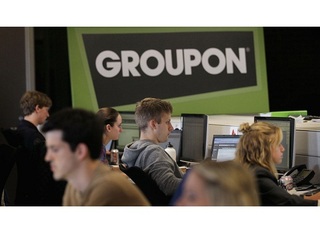
Groupon's story is a cautionary tale
The third time in less than a year, Groupon has had an accounting embarrassment

Groupon's story is a cautionary tale in accounting, as it once again restates its numbers.
Groupon has a sad history of revising figures, creating a cloud of uncertainty and suspicion about its credibility going forward. Who wants to rely on figures that are constantly being updated? And, being revised lower to boot? The latest restatement certainly raises the question about Groupon's internal controls.
It's no wonder shares have been on the decline ever since the stock closed at $27 on its first day of trading last November. Shares closed out last week at $18.
But it'll be interesting to see where they go from here, particularly since Groupon announced the revision late Friday, when it reported for the first time as a public company its financial results for the fourth quarter and the full year.
The company originally reported a loss of $42.7 million, or 8 cents per share, for the period in February. It said at the time that its revenue for the quarter was $506.5 million. Groupon’s fourth quarter revenue has now been revised down to $492.2 million, down 3%, or $14.3 million, from the original figure.
Groupon also revised its expenses for the quarter, forcing it to reduce operating income by $30 million and net income by $22.6 million and earning per share by $.04. It stated that there was no change made to the financial results of the first three quarters of 2011 and the company says it is standing by its previous projected growth of $510 to $550 million in first quarter 2012.
A Groupon spokeperson told Forbes that the revised numbers were a result of a larger-than-expected number of returned deals on high-priced items like Lasik eye surgery and spa packages.
"We remain confident in the fundamentals of our business, as our performance continues to highlight the value that we provide to customers and merchants," said Jason Child, Groupon CFO, said in the statement.
In addition, Groupon also announced that it is extending its lock-up period, which was meant to expire on May 2 until June 1. A lock-up period is an extended amount of time after the closing on IPO where shareholders in the company are not allowed to sell their stock.
Groupon could not be reached for comment.
Groupon's history of accounting errors
Groupon filed for a $750 million IPO in June 2011, but in August of last year the company was forced to discard its “adjusted consolidated segment operating income” accounting method which inflated the value of the company by not counting customer acquisition, online marketing, or stock-based compensation. Then, in September, it had to revise its 2010 results because of an accounting error that counted fees paid to merchants as revenue. Groupon said they made $713.4 million in revenue for 2010, while the SEC found the number to be $312.9 million. Groupon was eventually forced to revise the number.
The problems about its accounting had been raised many times well before the company went public. You'd think that it would have gotten it under control at that point.
It's a shame that a company that was already sporting fabulous growth figures and revenue would feel the need to juice them even more. Part of investing in a company is investing in the integrity of its management team.
So far, the company seems to be increasingly losing that credibility.
(Image source: latimesblogs.latimes.com)
Related News


Groupon releases new S-1, adds cautionary tone

Breaking: Groupon files for IPO

Groupon reports surprise Q4 loss; shares slammed 13%

Groupon surges 30% to close at $26 on IPO trading day

